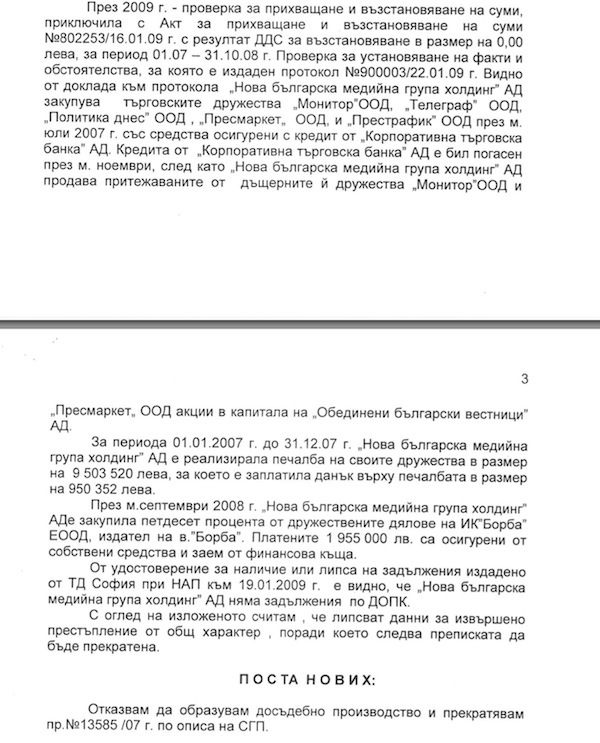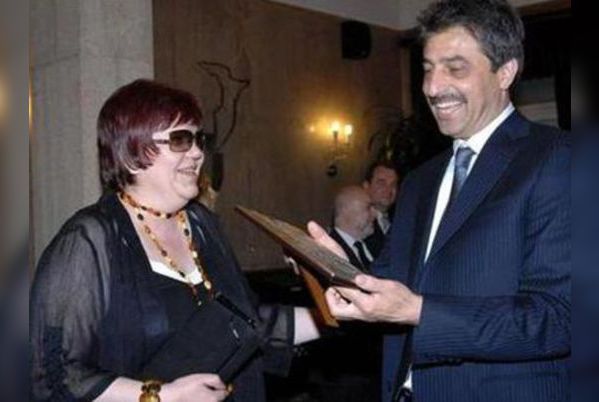The prosecutor in the case of collapsed Corporate Commercial Bank (CCB), Ivan Geshev, and the MP from the party Movement for Rights and Freedoms (DPS), Yordan “The Fraud” Tsonev repeatedly spoke in public recently, stating and stressing that DPS lawmaker and controversial businessman Delyan Peevski was not connected with CCB through loans and had not done anything wrong. That is why his name was missing in the indictment.
These statements are, to put it mildly, manipulative, according to Bivol‘s investigations and publications made long before the bankruptcy of CCB. As early as 2012, after a request under the Access to Public Information Act (APIA), Bivol received a prosecutorial decree, in which it was written in black and white that Delyan Peevski’s mother, Irena Krasteva, had bought the press group “Monitor” with a loan from CCB.

The Prosecutor’s Office probe reveals that the loan from CCB was taken in July 2007 and was paid off in November 2007, after the sale of the shares of Monitor and Pressmarket in the capital of United Bulgarian Newspapers.
“…funds provided through a credit from Corporate Commercial Bank. The credit from Corporate Commercial Bank was repaid in November after New Bulgarian Media Group Holding sold the shares of its subsidiaries Monitor and Pressmarket in the share capital of United Bulgarian Newspapers.”
This was also the time when CCB majority shareholder, Tsvetan Vassilev, and Irena Krasteva were together on the board of United Bulgarian Newspapers, created for the privatization of the publishing and printing house Rodina.
Therefore, there is undisputable evidence of the Bank’s lending to connected parties in violation of the law, however, this evidence has not been investigated by the Prosecutor’s Office. Such a selective approach only speaks of incomplete and biased work.
Bivol tracked all available links in the Trade Register and established the exact mechanism by which the millions for “media shopping” left the bank.
The conclusion of our investigation is that the CCB loan was repaid with other CCB money that went through the same syphoning scheme through hollow companies and connected parties for which, according to the penal decree, banker Tsvetan Vassilev is charged.
To formally repay the original loan to CCB, Irena Krasteva and Tsvetan Vassilev set up a new company, which bought the shares of New Bulgarian Media Group Holding acquired through a loan from CCB.
In this new company, BGN 6 million came from Vassilev’s company TC-IME and another BGN 6 million from a company of Irena Krasteva.
It is clear that the TC-IME money originated from the huge loans received from CCB, for which Vassilev is now accused, but not Peevski or his mother.
The origin of the BGN 6 million, which Irena Krasteva miraculously pulled out to pay the original loan from CCB, remains unclear and has not been probed by the Prosecutor’s Office. Did this money come from another, secret loan, received again from CCB, but for which there is no public data? According to banker Tsvetan Vassilev, this was precisely the scheme.
Vassilev, himself, adamantly denied ever financing Peevski before their falling off. However, after he broke up with his former business partner, he specifically and unequivocally acknowledged in a TV interview that he had granted money from the Bank for Peevski’s business projects.
Nevertheless, despite the existence of irrefutable documents and testimonies, the prosecution completely ignored the role of Irena Krasteva and her son as accomplices in the draining of the Bank through loans for various business projects.
An objective probe into the financial flows in the purchase of shares and property in a number of Bulgarian media will inevitably lead to accounts in CCB. There are also enough witnesses who cannot deny during an interrogation that they have negotiated the sale of their media shares directly with Delyan Peevski and that the payments under these contracts were then transferred to them from CCB. Some of the receiving accounts were even open directly in CCB, so the amounts only changed account numbers, but not the bank. However, there are no such checks and interrogations in the lengthy indictment of the prosecution. Its bias is quite obvious, while MP Tsonev’s position is even of lesser value because of the close political and other ties between him and Peevski.
As early as 2011, Bivol published, as a WikiLeaks partner, a classified cable to the State Department by former US Ambassador in Sofia, Nancy McEldowney, focusing on the problems with Bulgarian media and including a precise diagnosis, albeit in a diplomatic language – corruption, political servitude and a strategic conquest of media ownership and influence by Peevsky’s and his mother’s “New Media Group”:
- (C) With the overabundance of both traditional and new media outlets, many cannot survive on advertisement revenues alone and are reliant on donors. The new local private media owners, who unlike their predecessors have no journalistic background, use the media to influence the public and promote their business interests through the selected release of information and targeted attacks. Among the more dominant players is the recently formed conglomerate New Media Group, which is speculated to own three national dailies and one weekly newspaper, one regional newspaper and one television station, with rumored plans to purchase another. The Group jump-started in the summer of 2007 with the acquisition of three papers, one of which, the Telegraph Daily, has become the largest circulation daily with over 100,000 copies on Saturdays and 60,000-70,000 on workdays. The Group is rumored to belong to the circle of companies close to the current junior government coalition partner, the Movement for Rights and Freedom (MRF) political party. The reported head of the Group, Irena Krustova, is a former government official with no credible means to afford such an investment.
- (C) Local media outlets regularly practice self-censorship and even have black lists of politicians and rival businessmen that are neither interviewed nor covered. The New Media Group recently printed the exact same article in all of its newspapers in apparent targeted attacks against its business and political enemies. The Group has resorted to this practice on at least two previous occasions, the January gas crisis and the April garbage crisis in Sofia. The national daily Sega and the Standart daily have been criticized for more subtly representing the interests of their business mogul owners. Similar trends are visible in television media, except at a much higher cost to business and political interests.
The analysis and the conclusions of the US authorities on the role of Peevski’s media are more than exact and find their perfect confirmation today. The only difference is that over the years and with money from CCB, the media empire expanded even more with more newspapers ending in Peevski’s controlled propaganda zone.
The full text of the prosecutor’s decree can be seen here, in our publication from 2014.
***
If you find this article useful, support our work with a small donation.
Pay a Bivol Tax!
We will highly appreciate if you decide to support us with monthly donations keeping the option Monthly
The form is not published.
IBAN: BG27 ESPY 4004 0065 0626 02
BIC: ESPYBGS1
Титуляр/Account Holder: Bivol EOOD
При проблеми пишете на support [at] bivol [dot] bg
This post is also available in: Bulgarian










You must be logged in to post a comment.